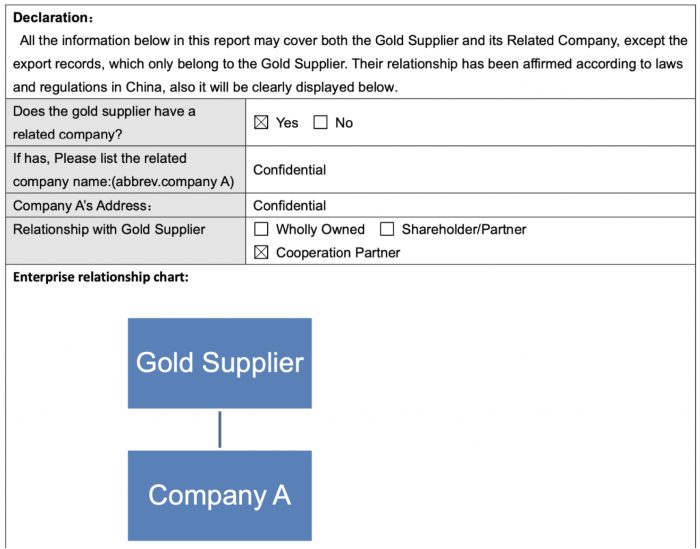Alibaba’s business managers are looking for ways to get more money. That’s understandable. But I think the way they achieve their objectives is downright shameful and need to be called out.
Many of their paying customers are companies that resell & export products. And those companies have a problem: many customers do not want to deal with a trading company. They want to deal directly with a manufacturer.
So, if Alibaba finds ways to make those companies look like manufacturers, they will get more business and they will spend more on Alibaba. That’s the heart of the problem.
And it means buyers have to be very careful with the information shown on Alibaba (and that’s also true, at varying degrees, with Made-In-China, Global Sources, and others).
An example of a trading company that is made to look like they own/control a factory
Let’s look at a recent example. A first-time importer truly believed the supplier operated a factory, and that was incorrect.
After I challenged that assumption, the importer wrote to the supplier and got this response: “Our company was already checked by Intertek, please see attached files”, and they sent these three so-called assessment reports:
- One about the products (in effect, functioning as a sales brochure);
- One about the supplier;
- One about factories making some of the products sold by the supplier.
When I looked at it, it became obvious the supplier was a trading company. But all those documents are prepared in a way to obfuscate it, at least in the eyes of inexperienced importers.
Here is a screen capture from one of the reports:

“Their relationship has been affirmed according to laws and regulations in China” means very little. However, it can sound like “oh, it’s different legal entities due to the way things work over there, but actually they are closely related”.
The “enterprise relationship chart” looks a lot like a mother-subsidiary relationship within a group. I believe that’s very much on purpose.
Other signs of Alibaba muddying the waters on purpose
A few years ago, I wrote An Alibaba Gold Supplier Status Doesn’t Mean Anything to dispel a common misunderstanding:
A terrible factory that increases prices at the last minute and delivers substandard quality can be “gold supplier”.
A couple of people setting up a trading company and renting an office can be “gold supplier”.
And, more recently, I wrote What Are the Factory Assessment Reports Shown on Alibaba Worth? to show how meaningless those so-called assessments are:
I recently reviewed such a report, and here are some of my notes:
- The word “Verified” is shown prominently. It only means the supplier exists and has a real business license…
- I am nearly sure a lot of the information is pre-filled by the supplier. It includes commercial information (e.g. how fast they respond to inquiries, whether they have an overseas showroom…), which only reinforces my point: this is a document intended as marketing collateral, not for screening potential suppliers.
- The in-house testing devices are far from sufficient for properly testing the products they sell. There should be a remark about that in the report.
- Product certifications are mentioned, but they seem not to have been checked. For example, I found that the certification is issued by a lab that is not on the list of approved certification bodies for that scheme. That only took a few minutes to find out…
- The quality system is reviewed in a way that ensures nothing bad is reported. There are no comments. If the assessor thinks it is “adequate” and “acceptable”, he ticks a “yes”. There is no standard to indicate what can be deemed adequate…
In summary, a potential customer will have no idea what quality standard the factory follows, what their average defect rate is, what their on-time shipment performance has been, and other important pieces of data.
I could also write about their “Trade Assurance”, which some buyers mention to me as “Trade Insurance”. Well, in fact, it is far from being insurance. Again, doesn’t that look like intentional misleading of buyers?
*******
I know a lot of experienced people in the industry will roll their eyes and say “so what? everybody knows it’s just advertisement and one has to check everything”.
But what about first-time buyers? Don’t they deserve a chance? If they spend 1 year developing a new product with a “supplier”, don’t they deserve to know that company’s business model? I have seen a number of new product development projects get seriously derailed because of such mistakes.
I think we need to do our job and point to those distortions of reality. We have to put pressure on Alibaba. Stop deceiving buyers.
Have your say…
What’s your take on this issue? Let me know by commenting, please.

